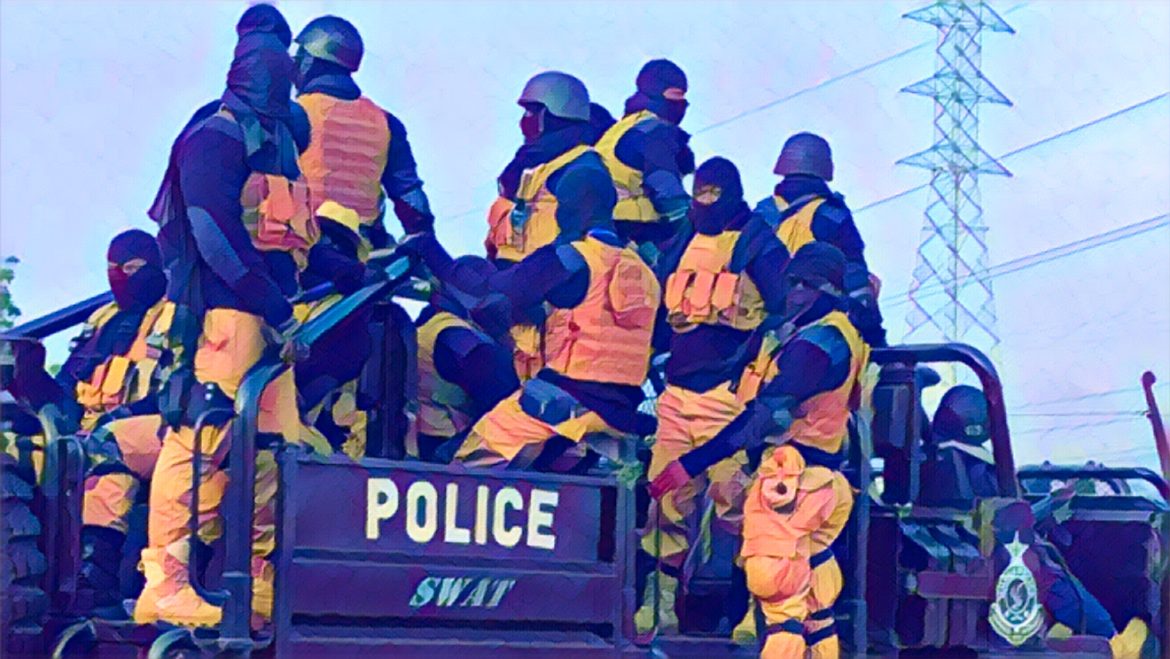KEY POINTS
- National SWAT violates constitutional provisions, says Dr. Agordzo.
- Election security should remain under the Ghana Police Service.
- Inclusivity and transparency are crucial for credible elections.
Dr. Benjamin Agordzo, Police Planning Officer at the UN Mission Support for Justice Reform, urged the exclusion of the National Special Weapons and Tactics (SWAT) unit from Ghana’s 2024 elections. Speaking at the Peace Through Democracy forum, Dr. Agordzo called the unit “illegal” and unnecessary. He argued that SWAT’s existence violates constitutional provisions, threatening peace and credibility during elections.
According to him, the Ghanaian Constitution mandates that no police service should exist outside the Ghana Police Service unless created by an Act of Parliament. “Where from the National SWAT? Who created it, and under what Act of Parliament?” he questioned. He emphasized that election security must remain the police’s responsibility.
Dr. Agordzo also criticized SWAT’s training and orientation, which he claimed serve specific regimes. This bias, he said, undermines the neutrality required for effective election security.
What Ayawaso West Wuogon teaches about security risks
Dr. Agordzo highlighted the Ayawaso West Wuogon by-election of January 2019 as a warning sign. During the by-election, violence erupted, including a shooting incident at the home of NDC candidate Mr. Kwasi Delali Brempong. The incident injured 18 people, while an observer at a polling station was also assaulted.
“This incident remains fresh in our minds,” Dr. Agordzo noted. He stressed that SWAT’s involvement in such cases damages public trust and disrupts the democratic process. Repeating these mistakes in 2024 could worsen Ghana’s democratic standing.
Alternative strategies to ensure credible elections
To avoid similar outcomes, Dr. Agordzo proposed strengthening the Ghana Police Service to manage election security independently. He also urged early engagement with stakeholders, such as civil society groups and think tanks, to improve transparency. “Their inclusion in the National Election Security Task Force ensures diverse views are considered,” he said.
He further suggested distinguishing security strategies for by-elections and general elections. “We can’t saturate security forces in a single constituency during national elections,” he stated. Efficient resource allocation, he argued, is vital for successful nationwide elections.
Lastly, Dr. Agordzo advised against deploying military personnel to polling stations, referencing incidents in Techiman South during previous elections. “We can conduct peaceful elections without military involvement,” he concluded. By implementing these strategies, he believes Ghana can safeguard its democratic processes and uphold its credibility.





5 comments
Bei den Prize Drops musst einfach zu einer speziellen Zeit an besonderen Slots spielen, um per Zufallsgenerator
einen Preis zu erhalten. Wer einen hohen Willkommensbonus mit vielen Freispielen liebt, kommt
an dem Bull Casino nicht vorbei. Der Willkommensbonus mit 5.000€ und 250 Freispielen hat mich
mit dem langen Umsatzzeitraum von 30 Tagen überrascht.
Ja, neue Spieler im Bull Casino erhalten 200 % bis zu 400 € plus 200 Freispiele nach der ersten Einzahlung.
Die Spiele sind mit unterschiedlichen Limits verfügbar und lassen sich sowohl kostenlos im Demo-Modus als auch mit Echtgeld spielen. Dieses Cashback-System bietet eine wertvolle
Absicherung für aktive Spieler und sorgt dafür, dass auch bei Verlusten ein Teil des Einsatzes erhalten bleibt.
Freispiele gelten meist 1–2 Tage und unterliegen ebenfalls
dem bekannten 40x-Umsatz. Zwischen Freitag und Sonntag einzahlen und sich 50 Freispiele sichern – das ist der Standard am Wochenende.
Die Aktionen wechseln oft und sind manchmal an bestimmte Feiertage oder Game-Releases gebunden – da wird’s nicht langweilig.
VIP-Spieler profitieren von höheren Auszahlungslimits und schnelleren Bearbeitungszeiten.
References:
https://online-spielhallen.de/gizbo-casino-erfahrungen-ein-detaillierter-spielbericht/
To do this, open the RocketPlay website in Chrome, tap the three-dot menu,
and choose “Add to Home Screen.” This enables instant access to the casino with just one tap.
All games are available in mobile format without the
need to download additional software. The site adjusts automatically
to screen size, maintaining a full range of functions including sign up, gameplay,
and banking. Players can explore traditional games or try newer formats with dynamic features.
It’s worth noting that the casino offers an exclusive promotion for
our readers, with 200 free spins gifted to users
who deposit at least $50. 7BitCasino, one of the best crypto casinos, is welcoming new users with 75 free spins with no deposit required.
There are many payment methods available at online casinos, including PayID, POLi, Paysafecard, MiFinity, cryptocurrencies like Bitcoin, e-wallets like Skrill, and debit cards.
Crypto, such as Bitcoin and Litecoin, is accepted at many online casinos in Australia.
Deposits are instant and free at the best online casinos in Australia, but withdrawals are not supported.
You can chat with professional dealers and immerse yourself in classic table games, streamed live
from professional studios that replicate the look and feel of
a real casino.
References:
https://blackcoin.co/sweeps-oasis-casino/
He blends his teaching experience with digital tools to make learning
accessible to a global audience. Important is a useful
word, but it is broad. When you match the synonym to the reason, your English sounds
clearer. Use serious when you want to show
gravity or risk, and important when you want to show value or priority.
Synonyms for important help you explain value
and priority in a clearer way. Learn a new word every day.
Comprehensive resource for word definitions and usage
References:
https://blackcoin.co/persuading-and-preventing-bluffs-in-poker/
online casino uk paypal
References:
https://rentry.co/74098-best-paypal-casinos-2025-online-casinos-accepting-paypal
paypal casino online
References:
clicknaukari.com